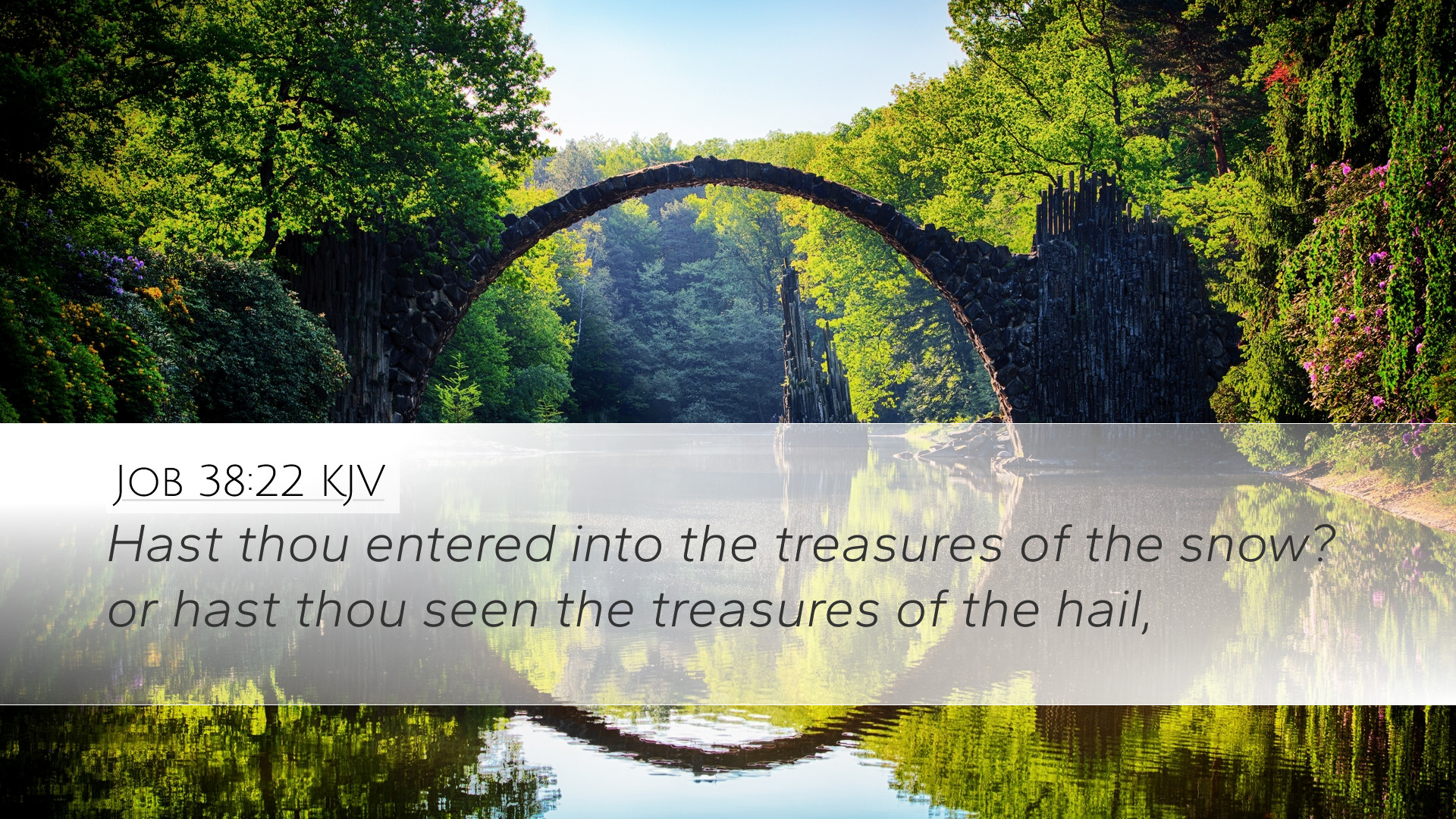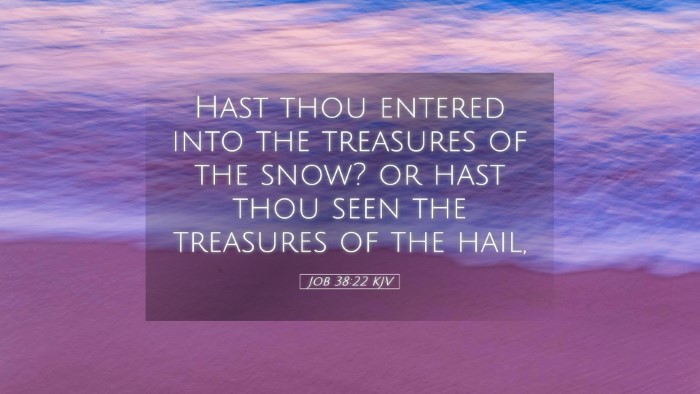Commentary on Job 38:22
Verse: "Hast thou entered into the treasures of the snow? or hast thou seen the treasures of the hail?" (Job 38:22, KJV)
Introduction
This poignant verse from the book of Job marks a pivotal moment in the discourse between God and Job. After a lengthy trial and severe questioning, Job is confronted by God in a whirlwind, emphasizing His sovereignty and wisdom. This verse specifically addresses the mysteries of creation, inviting readers to consider the treasures hidden in the natural world—snow and hail—as divine manifestations of God's greatness.
Contextual Analysis
Historical Setting: The Book of Job is part of the Wisdom Literature of the Old Testament, dealing with profound questions regarding suffering, justice, and divine providence. Job, a man of great integrity, experiences immense suffering, and his friends attempt to explain his afflictions through their limited understanding of God’s justice.
The Divine Speech: Chapters 38-41 transition from Job's lamentations to God's response. God employs a series of rhetorical questions to highlight Job's limitations in understanding the vastness of creation, which invokes deep theological reflection.
Commentary Insights
Matthew Henry’s Commentary
Matthew Henry emphasizes that the treasures of snow and hail reflect God's power and wisdom in creation. He noted that snow and hail, both often viewed as chaotic aspects of nature, are under God's control, serving His purposes. Henry points out that God's inquiry into Job's knowledge regarding these phenomena challenges human arrogance and invites humility.
Albert Barnes’ Commentary
Albert Barnes expands on the phrase "treasures of the snow," interpreting it as a metaphor for the hidden, beneficial resources found in creation. He highlights that while snow may appear to be merely a hindrance in daily life, it plays a vital role in the ecological cycle, benefiting agriculture through the gradual release of water. Barnes notes that this verse simultaneously acknowledges God's design and the complexity of nature—inviting readers to marvel at the intricacies of God’s handiwork.
Adam Clarke’s Commentary
Adam Clarke provides a linguistic exploration of the words "treasures" and "snow." He suggests that the term treasure implies value and purpose. Clarke elaborates that God’s design for snow and hail is not just for physical phenomena but also symbolizes spiritual truths, potentially referencing purity, cleansing, and divine protection. His final observation relates the treasures of snow and hail to the broader themes of God's protection and providency over creation.
Theological Reflections
This verse serves several theological purposes:
- The Sovereignty of God: It emphasizes God's supreme authority over creation and His intentional design in all natural phenomena.
- The Mystery of Creation: The inquiry into the treasures of nature invites believers to explore the depths of creation's mysteries and their implications for faith.
- Encouragement for Humility: By reflecting on His creation, God calls humanity to recognize its limitations and the need for humility before the divine.
Practical Applications
For pastors, students, theologians, and Bible scholars, Job 38:22 invites several critical applications:
- Encouragement in Suffering: Just as Job was reminded of the Creator’s wisdom, individuals facing trials can find solace in the understanding that God’s design surpasses human comprehension.
- Promotion of Creation Care: Recognizing the treasures in nature can inspire believers to honor and care for creation.
- Calls for Worship: The beauty and complexity of God’s creation depicted in this verse prompt a response of worship and reverence for the Creator.
Conclusion
Job 38:22 is a rich text that invites an exploration of creation, divine sovereignty, and the mysteries of God’s workings. Engaging with this verse through the insights of revered commentators encourages a posture of humility, reverence, and awe as one contemplates the greater theological truths revealed through God’s creation. It serves as a reminder that everything in the natural world is infused with divine purpose—extending far beyond our immediate understanding.


